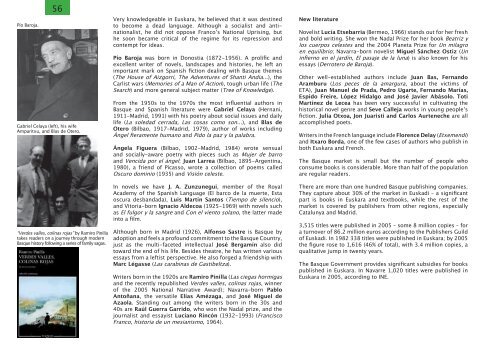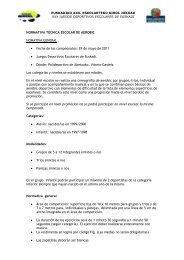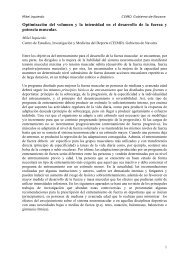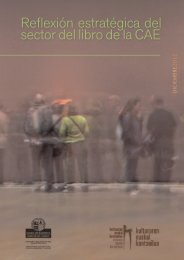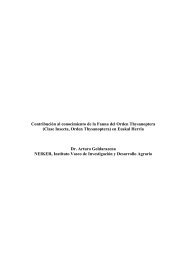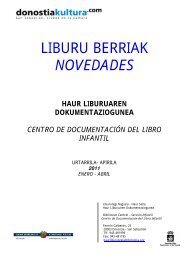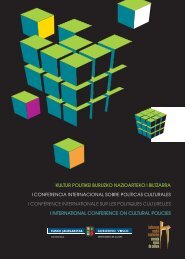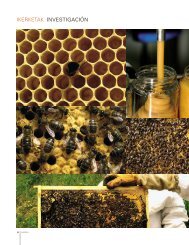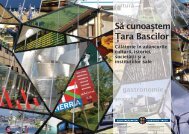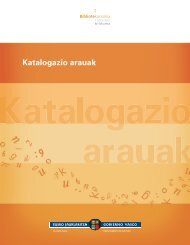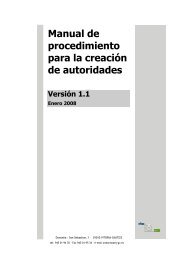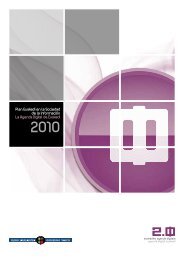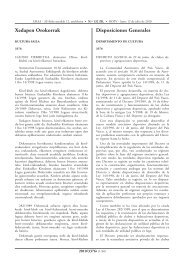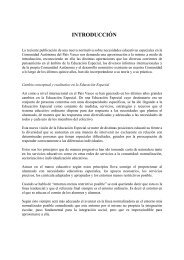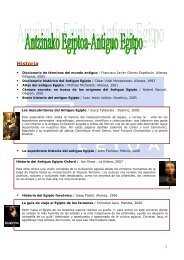The Basque Country (pdf, 4,3Mb) - Kultura Saila - Euskadi.net
The Basque Country (pdf, 4,3Mb) - Kultura Saila - Euskadi.net
The Basque Country (pdf, 4,3Mb) - Kultura Saila - Euskadi.net
Create successful ePaper yourself
Turn your PDF publications into a flip-book with our unique Google optimized e-Paper software.
Pío Baroja.<br />
56<br />
Gabriel Celaya (left), his wife<br />
Amparitxu, and Blas de Otero.<br />
“Verdes valles, colinas rojas” by Ramiro Pinilla<br />
takes readers on a journey through modern<br />
<strong>Basque</strong> history following a series of family sagas.<br />
Very knowledgeable in Euskara, he believed that it was destined<br />
to become a dead language. Although a socialist and antinationalist,<br />
he did not oppose Francoʼs National Uprising, but<br />
he soon became critical of the regime for its repression and<br />
contempt for ideas.<br />
Pío Baroja was born in Donostia (1872-1956). A prolific and<br />
excellent writer of novels, landscapes and histories, he left an<br />
important mark on Spanish fiction dealing with <strong>Basque</strong> themes<br />
(<strong>The</strong> House of Aizgorri, <strong>The</strong> Adventures of Shanti Andia...), the<br />
Carlist wars (Memories of a Man of Action), tough urban life (<strong>The</strong><br />
Search) and more general subject matter (Tree of Knowledge).<br />
From the 1950s to the 1970s the most influential authors in<br />
<strong>Basque</strong> and Spanish literature were Gabriel Celaya (Hernani,<br />
1911-Madrid, 1991) with his poetry about social issues and daily<br />
life (La soledad cerrada, Las cosas como son...), and Blas de<br />
Otero (Bilbao, 1917-Madrid, 1979), author of works including<br />
Ángel fieramente humano and Pido la paz y la palabra.<br />
Ángela Figuera (Bilbao, 1902-Madrid, 1984) wrote sensual<br />
and socially-aware poetry with pieces such as Mujer de barro<br />
and Vencida por el ángel; Juan Larrea (Bilbao, 1895-Argentina,<br />
1980), a friend of Picasso, wrote a collection of poems called<br />
Oscuro dominio (1935) and Visión celeste.<br />
In novels we have J. A. Zunzunegui, member of the Royal<br />
Academy of the Spanish Language (El barco de la muerte, Esta<br />
oscura desbandada), Luis Martín Santos (Tiempo de silencio),<br />
and Vitoria-born Ignacio Aldecoa (1925-1969) with novels such<br />
as El fulgor y la sangre and Con el viento solano, the latter made<br />
into a film.<br />
Although born in Madrid (1926), Alfonso Sastre is <strong>Basque</strong> by<br />
adoption and feels a profound commitment to the <strong>Basque</strong> <strong>Country</strong>,<br />
just as the multi-faceted intellectual José Bergamín also did<br />
toward the end of his life. Besides theatre, he has written various<br />
essays from a leftist perspective. He also forged a friendship with<br />
Marc Légasse (Las carabinas de Gastibeltza).<br />
Writers born in the 1920s are Ramiro Pinilla (Las ciegas hormigas<br />
and the recently republished Verdes valles, colinas rojas, winner<br />
of the 2005 National Narrative Award); Navarra-born Pablo<br />
Antoñana, the versatile Elías Amézaga, and José Miguel de<br />
Azaola. Standing out among the writers born in the 30s and<br />
40s are Raúl Guerra Garrido, who won the Nadal prize, and the<br />
journalist and essayist Luciano Rincón (1932-1993) (Francisco<br />
Franco, historia de un mesianismo, 1964).<br />
New literature<br />
Novelist Lucía Etxebarria (Bermeo, 1966) stands out for her fresh<br />
and bold writing. She won the Nadal Prize for her book Beatriz y<br />
los cuerpos celestes and the 2004 Pla<strong>net</strong>a Prize for Un milagro<br />
en equilibrio; Navarra-born novelist Miguel Sánchez Ostiz (Un<br />
infierno en el jardín, El pasaje de la luna) is also known for his<br />
essays (Derrotero de Baroja).<br />
Other well-established authors include Juan Bas, Fernando<br />
Aramburu (Los peces de la amargura, about the victims of<br />
ETA), Juan Manuel de Prada, Pedro Ugarte, Fernando Marías,<br />
Espido Freire, López Hidalgo and José Javier Abásolo. Toti<br />
Martínez de Lecea has been very successful in cultivating the<br />
historical novel genre and Seve Calleja works in young peopleʼs<br />
fiction. Julia Otxoa, Jon Juaristi and Carlos Aurteneche are all<br />
accomplished poets.<br />
Writers in the French language include Florence Delay (Etxemendi)<br />
and Itxaro Borda, one of the few cases of authors who publish in<br />
both Euskara and French.<br />
<strong>The</strong> <strong>Basque</strong> market is small but the number of people who<br />
consume books is considerable. More than half of the population<br />
are regular readers.<br />
<strong>The</strong>re are more than one hundred <strong>Basque</strong> publishing companies.<br />
<strong>The</strong>y capture about 30% of the market in <strong>Euskadi</strong> – a significant<br />
part is books in Euskara and textbooks, while the rest of the<br />
market is covered by publishers from other regions, especially<br />
Catalunya and Madrid.<br />
3,515 titles were published in 2005 – some 8 million copies – for<br />
a turnover of 86.2 million euros according to the Publishers Guild<br />
of <strong>Euskadi</strong>. In 1982 338 titles were published in Euskara; by 2005<br />
the figure rose to 1,616 (46% of total), with 3.4 million copies, a<br />
qualitative jump in twenty years.<br />
<strong>The</strong> <strong>Basque</strong> Government provides significant subsidies for books<br />
published in Euskara. In Navarre 1,020 titles were published in<br />
Euskara in 2005, according to INE.


